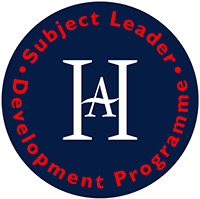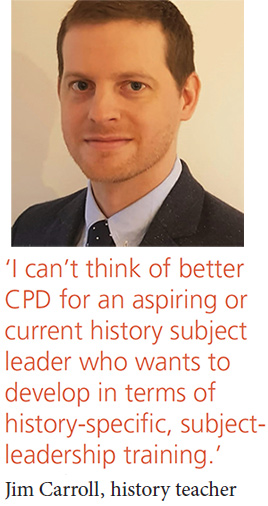Subject Leader Development Programme
Spring 2025 cohort

Subject Leader Development Programme

Welcome to the Historical Association's online course for developing subject leadership in history teaching. Led by a team of 6 experienced subject leaders, including Hugh Richards, Sharon Aninakwa, Ruth Lingard, David Hibbert, Elizabeth Carr and Catherine Priggs, this course will equip history leaders fully for the demands of the role and middle leadership. Find out more
Spring meeting dates
- Thursday 9 January, 4pm-5pm
- Thursday 27 February, 4pm-5pm
- Thursday 20 March, 4pm-5pm

|
Please read the SLDP terms and conditions carefully before you register for a place on the programme. Please also refer to the CPD Events terms and conditions.
Payment must be made online by card, however you can request a VAT receipt following payment by emailing events@history.org.uk
|
If you're not an HA Member, before purchasing the resource below please click to create a free account in a new window. Return to this tab when you’re set – you may need to refresh this page. Alternatively you can become a Member using the Join button below (this will not open in a new window, so you'll need to bookmark this page). |
This resource is available to purchase
Non-member instant-access price: £208.00
HA Members can get instant access for £135.00
Limited access: 30 available to purchase
Unit 1. Introduction
- 1.1 Introduction to the course
Unit 2: The role of the Subject Leader
- Unit 2: The role of the Subject Leader
- 2.1 Key responsibilities as a Subject Leader for History
- 2.2 Culture and Climate in the History Department
- 2.3 Your tools for growing and cultivating your department
- 2.4 Sources of support
Unit 3: Strategic Planning
- Unit 3: Strategic Planning
- 3.1 Evaluating what you already have
- 3.2 Time management
- 3.3 Curricular vision
- 3.4 Leading and managing change
- 3.5. Systems thinking in Subject Leadership
Unit 4: Curriculum Leadership Part 1: KS3
- Unit 4: Curriculum Leadership Part 1: KS3
- 4.1 KS3 curriculum decision-making
- 4.2 Implementing KS3 improvements
- 4.3 Managing staff and process over time
- 4.4 Monitoring and evaluating implementation
- 4.5 Building the profile of History
Unit 5: Curriculum Leadership Part 2: KS4
- Unit 5: Curriculum Leadership Part 2: KS4
- 5.1 Choosing and changing specifications
- 5.2 Long term planning and course organisation
- 5.3 The relationship between specifications and textbooks
- 5.4 Sensible approaches to exam preparation
- 5.5 Improving uptake for exam courses
Unit 6: Curriculum Leadership Part 3: KS5
- Unit 6: Curriculum Leadership Part 3: Key Stage 5
- 6.1 Choosing and changing specifications
- 6.2 Managing the NEA
- 6.3 Sensible approaches to exam preparation
- 6.4 Recruitment at KS5: building the reputation of the course
Unit 7: Improving Teaching Part 1: Developing your team
- Unit 7: Improving Teaching Part 1: Developing your team
- 7.1 Improving teaching and developing your team
- 7.2 Fostering a culture of improvement
- 7.3 Creating the conditions for teacher growth
- 7.4 Hiring new team members
- 7.5 Supporting Early Career Teachers
Unit 8: Improving Teaching Part 2: Leading a CPD programme
- Unit 8: Improving Teaching Part 2: Leading a CPD programme
- 8.1 Principles for growing great teachers
- 8.2 How to design a CPD programme and individual session
- 8.3 Improving departmental subject knowledge
- 8.4 Constructing a CPD programme: example I
- 8.5 Constructing a CPD programme: example II
Unit 9: Improving Teaching Part 3: Responding to data
- Unit 9: Improving Teaching Part 3: Responding to data
- 9.1 Demystifying the exam marking process
- 9.2 What can we meaningfully learn from data analysis?
- 9.3 Responding to mid-year data
- 9.4 Responding to end of year data, Hugh Richards
Unit 10: Improving Teaching Part 4: Performance Management
- Unit 10: Improving Teaching Part 4: Performance Management
- 10.1 Good targets for History teachers and other PM advice
- 10.2 Making Performance Management and Departmental Reviews Developmental
- 10.3 Mentoring and Coaching
Unit 11: Working with SLT
- Unit 11: Working with SLT
- 11.1 What do you need from SLT and what do SLT need from you?
- 11.2 Working within school constraints and carving out space for good history
- 11.3 Making line management meetings productive
- 11.5 Insights from SLT with a History background, Rich Kennett and Catherine Priggs
Unit 12: Preparing for Ofsted
- Unit 12: Preparing for Ofsted
- 12.1 Interview with Tim Jenner, Subject Lead for History, Ofsted
- 12.2 Reflections on a 2019 inspection under the new framework
- 12.3 Reflections and advice to subject leaders on the new Ofsted Framework
- 12.4 Paper: Reflections on SLDP Interview with Tim Jenner
Unit 13: Soapboxes and Fireside Chats
- Unit 13: Soapboxes and Fireside Chats
- Soap box: school history trips
- Fireside chat: the importance of embracing failure
- Overcoming the loneliness of leadership



 Teach Secondary Awards 2024: Highly Commended
Teach Secondary Awards 2024: Highly Commended